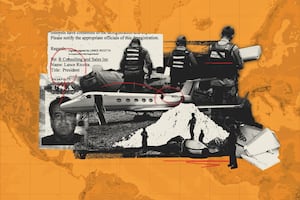Más Información

En SLP nunca ha existido una gobernadora y ahora hay una posibilidad real que así sea, asegura Ricardo Gallardo tras aprobación de "Ley Esposa"

Morena analiza disminución de pluris y elección popular de consejeros del INE: Monreal; serán revisadas en la reforma electoral, dice

Rastro de jets vinculados al narcotráfico lleva a un vendedor en California… y a un punto ciego de la regulación aérea en Estados Unidos

Secretaría Anticorrupción sanciona a dos empresas por buscar contratos con información falsa; imponen multa de miles de pesos

Banxico se despide de 2025 con otro recorte a la tasa de interés; queda en 7% por ajuste de 25 puntos base
Of the wars that took place in the Americas during the XX century, the Mexican Revolution was the deadliest and one with unprecedented demographic consequences.
When talking about the human loss as a result of the armed movement that took placed between 1910 and 1920, the most common figure cited is one million. However, some historians feel that that number downplays the real human cost that Mexico suffered as a result of the violence and crisis during that short period of time. According to the historian Javier Garciadiego and one of the most well-known scholars on the Mexican Revolution, human loss was well over one million.
“One million casualties has become a widespread figure that's been very difficult to eradicate. This is the figure that's used because according to the 1910 census, there were 15.5 million people in Mexico, and when the census was conducted again in 1921 there were 14.5 million people, that's where the famous figure comes from. However, the crisis was much worse because if the Revolution had never happened and had the country continued to grow uninterrupted, there would've been over 16 million people in the country by 1921,” explained Javier Gacriadiego in an exclusive interview with EL UNIVERSAL. He went on to say that the 1921 census wasn't even reliable due to statistical errors.
Based on these figures, he says that “around 10% of Mexico's population was lost, which is a huge and brutal loss of human life. This is the real human cost of the Mexican Revolution.”
To make matters worse, contrary to popular belief, most of these casualties weren't even a direct result of the war. “First of all, there was a lack of military technology. There were few soldiers in combat helmets. Most of them wore sombreros. Second, there weren't mass executions, despite the widespread coverage they received. In reality, executions were random, few and far between and isolated. Lastly, there were no concentration camps for POW's, which would've dramatically increased the number of casualties. This is why although high, the number of casualties during the Mexican Revolution were much lower than those during World War I, for example.”
For a better understanding of human casualties and the losses as a result of the armed uprising, the historian says that several factors must be taken into account, some of which have been largely ignored throughout history.
“There were at least four different causes for widespread casualties: violence, famine, disease and others never died, but disappeared. It's believe that between 200 and 300 thousand people fled to the U.S. during this time,” he explained. “Typhoid fever was one of the diseases that grew during this time, but it wasn't necessarily lethal. However, at the end of 1918, the so-called Spanish flu took hold and claimed between 400 and 500 thousand lives during this time. Worst of all is that this occurred over just a three to four-month period.”
If we talk about wars in the Americas, the Mexican Revolution has, without a doubt, been one of the most devastating seen in the region. Javier Gacriadiego says that knowing these statistics and demographics contributes to a better understanding of the consequences and results of the armed uprising that drove Mexico into unimaginable violence for 10 years. “It's important to be able to weigh what was obtained from what was lost and truly question oneself if what was obtained was actually worth it,” he continued.
Over 100 years after the Mexican Revolution, knowing this information should be taken into account by anyone who says that what Mexico needs is another revolution. “They should think twice before saying something that stupid,” he concluded.
Noticias según tus intereses
[Publicidad]
[Publicidad]








